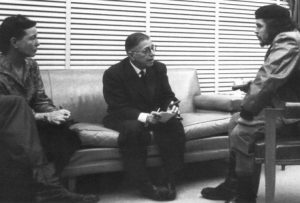Ronald Aronson in the Boston Review:
 Nearly forty years after his death in 1980, the French philosopher Jean-Paul Sartre is best remembered as the father of existentialism. We are most familiar with him as the theorist of freedom, authenticity, and bad faith in philosophical treatises such as Being and Nothingness (1943) and literary works such as Nausea (1938) and No Exit (1944). But eclipsed in this popular image is an appreciation of the staggering range of his dozens of volumes of published work, especially the fruit of his political activity from the end of World War II until his death—a period marked most notably by a rich and sustained engagement with Marxism.
Nearly forty years after his death in 1980, the French philosopher Jean-Paul Sartre is best remembered as the father of existentialism. We are most familiar with him as the theorist of freedom, authenticity, and bad faith in philosophical treatises such as Being and Nothingness (1943) and literary works such as Nausea (1938) and No Exit (1944). But eclipsed in this popular image is an appreciation of the staggering range of his dozens of volumes of published work, especially the fruit of his political activity from the end of World War II until his death—a period marked most notably by a rich and sustained engagement with Marxism.
Far from being consigned to the ash heap of history, the mid-century encounter between Marxism and existentialism remains vital today. As we seek political and philosophical bearings in this time of renewed calls for a socialist alternative to capitalism, postwar efforts to bring Marxism and existentialism together have much to teach us—not only because of the continuing importance of each mode of thought to political thinking and organizing, but also because their interaction in Sartre’s work deepens our understanding of how we exercise agency under conditions we do not control.
More here.
